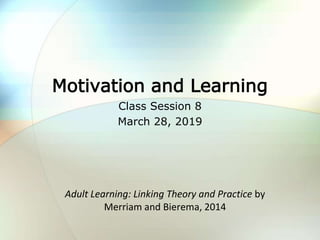
Class sessions 8 motivation and learning 3 28-19
- 1. Motivation and Learning Class Session 8 March 28, 2019 Adult Learning: Linking Theory and Practice by Merriam and Bierema, 2014
- 2. Agenda Key Concepts from chapter on Motivation and Learning Motivational strategies A “flow” test Your “to-don’t” list Reflecting on your motivation for learning Calculating Margin-in-Life
- 3. What is Motivation? • The drive and energy we put into doing what we want to do • Effort, perseverance, completion (Wlodkowski, 2008) • Intrinsic or extrinsic • Autonomy, mastery, and purpose (Daniel Pink (Drive, 2009) • the yearning to direct our own lives (self-directedness) • the compulsion to progress and improve (a mindset) • The desire to pursue something beyond ourselves
- 5. Classical Motivation Theories • Economic – rewards and punishments • Social – social and emotional effects of working in groups • Behavioristic –providing a stimulus to provoke response • Need-driven – hierarchy of needs • Cognitive – how thoughts influence actions
- 6. Significant Concepts The idea of “flow” – completely focused motivation for learning. • Ultimate experience in harnessing emotions in performing and learning • Emotions are contained and channeled: positive, energized, and aligned with the task at hand • Single-minded immersion: a deep focus on nothing but the activity, not even oneself
- 7. Concept of Flow • Seminal work, Flow: The Psychology of Optimal Experience • Achieving flow requires: • High level of challenge-skill balance • merging of action and awareness • immediate and unambiguous feedback • concentration on the task at hand • paradox of control • transformation of time • loss of self-consciousness • autotelic experience (intrinsically motivating) Csikszentmihalyi (pronounced CHEEK-sent-ma-HY-ee)
- 8. Give Yourself a (modified) “Flow” Test • Think back to moments of total engagement (flow) oWhere were you? oWhat were you doing? oWere you alone or with someone? • Do you have certain times of day that are more “flow- friendly” than others? • How might you increase opportunities to be in the “flow” state? • What can you now say about work, studies, or other activities? • How might you use the idea of “flow” with your learners?
- 9. What’s on Your To-Don’t List Behaviors and activities that drain your energy Create an agenda of avoidance to keep you away from the things that drain your motivational energy • End unimportant / unnecessary obligations • Eliminate time-wasting distractions
- 10. Reflect on Pink’s Questions about Motivation • When you think about your best work, what is most important to you? Autonomy over what you do (task) When you do it (time) How you do it (technique) With whom you do it (team) • How much autonomy do you have in your learning or teaching right now? • How many of your 168 hours last week did you devote to what really motivates you?
- 11. Be Mindful of “Cognitive Load” McClusky’s Margin-in-Life Theory (1963) Margin = Power where margin equals energy Load available for learning Power consists of the resources and capacity the individual has at his or her disposal to handle challenges Load consists of tasks of life (family, school, career) as well as internal self-concept, goals, personal expectations
- 12. Sometimes, learners are drinking from a fire hose
- 13. Elements of Load and Power Self and Societal Demands on Learner (LOAD) • External • Family commitments • Job responsibilities • Social obligations • Instructor too impatient • Civic duties/commitments • Internal • Expectations of self • Ideals • Goals • Values • Attitudes Learner’s Resources to Cope (POWER) External resources / capacity • Physical health • Economic wealth • Social abilities • Social contacts • Internal skills/experiences • Resiliency • Coping skills • Personality • Intelligence
- 14. Instructor-Generated Load • Attitude • Learner treated as inferior • Learner’s opinions ignored • Instructor too impatient • Instructor too rigid • Behavior • Instructor’s distracting mannerisms • Instructor’s mumbling • Instructor’s disorganization • Instructor’s lack of eye contact • Task • Inappropriate assignment • Unclear grading practices • Busy work • Too little time to do the assigned work • Environment • Cramped space, uncomfortable chairs • Poor lighting or noise • Room too hot, too cold
- 15. Minimizing Instructor-Generated Load • Acknowledge the concept of “load” exists for your learners • Understand their concerns do not just center on your learning agenda • Acknowledge that you may be contributing to load • Address the issue of margin (available energy for the task at hand)
- 16. Wlodkowski’s Conditions for Motivating Learners • Inclusion – provide opportunities for introductions to build connections • Building positive attitude toward learning • Meaning creation – give learners opportunities to respond and engage • Competence – provide effective feedback
- 17. Five Pillars of Motivating Instructors 1. Offer expertise 2. Express empathy 3. Show enthusiasm 4. Demonstrate clarity 5. Show respect From Enhancing Adult Motivation to Learn, R. Wlodkowski, 1999
- 18. How to Become More Motivating • Know your subject well enough to bridge the gap with what the learner knows • Continuously consider the learners’ perspective and feelings • Contribute to fulfilling the goals of the learner • Evoke passion for your subject matter and share your enthusiasm • Be your authentic self in front of learners • Communicate clearly –Plan your instruction like a road map by emphasizing important concepts and skills.
- 19. For next week, you have a blog post question to answer!
Editor's Notes
- Wlodkowski says these core characteristics are not magical, but can be learned, controlled, and planned for by anyone who instructs adults. If we lack any one of them, there will be far less ability to respond effectively to the complexities of engaging effectively with adult learners in any setting!
